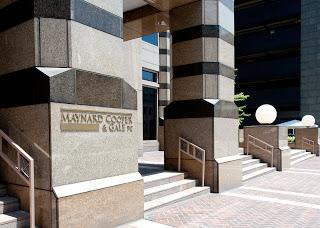
Offices of Maynard Cooper Gale in downtown Birmingham
(From fravert.com)
Since taxpayers are paying the bill, do they have a right to know how MCG is using that money? My answer is yes. Do they have a right to expect that MCG will represent Bentley and Stabler in an honest fashion? My answer, again, is yes. Are taxpayers getting the kind of legal services they have every right to expect? Absolutely not.
How do we know? It takes a close examination of the Motion to Dismiss MCG filed on behalf of Bentley and Stabler. It includes citations to law that are . . . well, "fanciful" is one word that comes to mind. "Creative" is another. "Fraudulent" is another. (Motion to Dismiss is embedded at the end of this post.)
Three MCG lawyers -- John Neiman Jr., Stephanie Houston Mays, and Mark D. Foley Jr. -- claim Bentley and Stabler are protected by sovereign immunity and should be dismissed from Collier's lawsuit. Here is probably the key argument, found on page 7 of the 13-page motion to dismiss:
Collier attempts to plead his way around state-agent immunity by alleging that the Governor’s actions “were willful, malicious, fraudulent, in bad faith and/or beyond [his]authority.” But the absolute sovereign immunity of constitutional officers does not have a “bad-faith” exception in suits for monetary damages.
The lawyers essentially are claiming the law protects Bentley's pocket book (and Stabler's) and frees him from the lawsuit, even when he acts in bad faith -- with willful, malicious, or fradulent intent, beyond his authority, The lawyers cite nine cases that supposedly support this proposition. But there is a slight problem: The cases do not say what the MCG lawyers claim they say.
The MCG lawyers are lying to the court, lying to the opposing party, and lying to taxpayers who are paying their fees.
A case styled Ex parte Cranman, 792 So.2d 392 (Ala. 2000), restated the rule governing state-agent immunity 16 years ago, making it probably the most important case on the subject in Alabama history. Here is a key finding from Cranman:
A State agent shall not be immune from civil liability in his or her personal capacity. . . .
(2) when the State agent acts willfully, maliciously, fraudulently, in bad faith, beyond his or her authority, or under a mistaken interpretation of the law."
In other words, Collier makes a correct citation to law -- showing that Bentley and Stabler are not protected by sovereign immunity when they act in bad faith, etc. -- and Bentley's lawyers are trying to muddy the waters by citing nine cases for a holding they do not make.
How do the MCG lawyers try to execute this little con game? First, we must recall that they are trying to convince the court that nine different cases support this proposition: "The absolute sovereign immunity of constitutional officers does not have a “bad-faith” exception in suits for monetary damages."
Let's look at one of the nine cases the lawyers for Bentley cite. It is styled Alexander v. Hatfield, 652 So. 2d 1142 - Ala: Supreme Court 1994, and Team Bentley claims the above proposition is found in section 1144. Here is what section 1144 of Alexander says:
We have also held that deputy sheriffs are immune from suit to the same extent as sheriffs. "In general, the acts of the deputy sheriff are the acts of the sheriff. The deputy sheriff is the alter ego of the sheriff." Carr v. City of Florence, Alabama, 916 F.2d 1521, 1526 (11th Cir.1990) . . . "[Under Alabama law, a] deputy is legally an extension of the sheriff. If the deputy's acts are generally considered the acts of the sheriff, it is logical that those acts should enjoy the same immunity covering the sheriff's own acts." Carr, at 1526, quoted with approval in Wright v. Bailey, at 303.
In this case, none of the exceptions set out in Parker v. Amerson applies. Deputy Hatfield was on duty when she left the papers at Alexander's place of employment Therefore, the summary judgment in favor of Deputy Hatfield, individually and in her official capacity, was proper, based on the sovereign immunity granted under Article I, § 14, of the Alabama Constitution of 1901.
Does this say anywhere that there is no "bad faith exception in suits for monetary damages"? No, it does not, and it does not say that at any point in the Alexander opinion. It also does not say that in any of the other eight cases Bentley's lawyers cite.
This is a crafty tactic of the unethical lawyer, a tactic I've seen many times in my own court battles. The lawyer cites a certain case, claims it says such and such . . . then, when you look up the case, it says no such thing.
Bentley and Stabler are relying on sleazy, corrupt lawyers to represent them. And taxpayers are being forced to pick up the tab. Taxpayers should be flooding the offices of Maynard Cooper Gale with complaints about the underhanded use of state funds.
Gov. Robert Bentley motion to dismiss by pgattis7719 on Scribd
